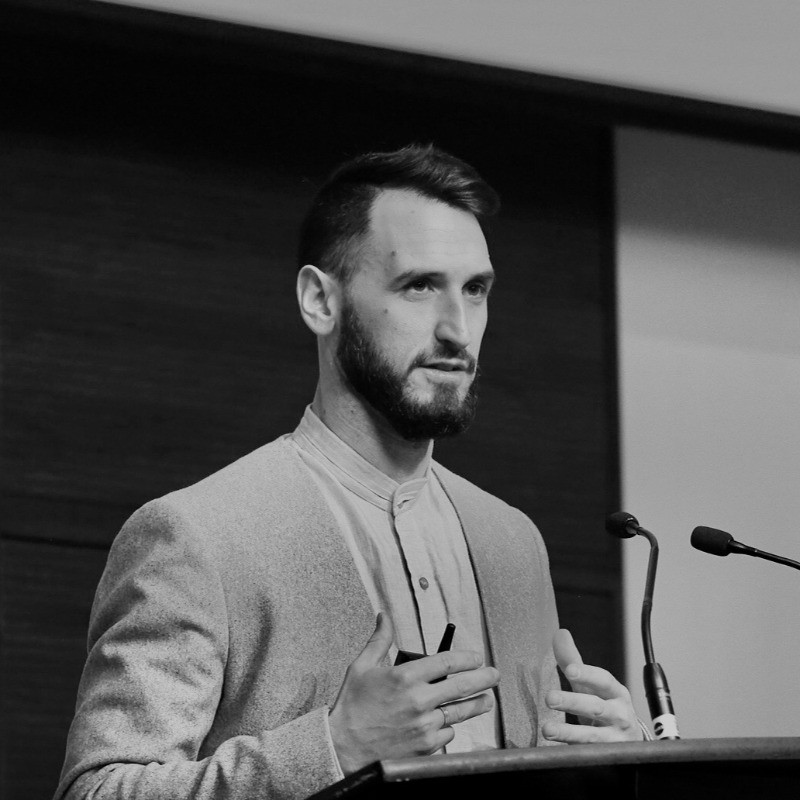Annual Report 2024–25
Foreword by Jeni Tennison
Welcome to our third annual report! Here, you can learn more about what we’ve been up to, and the impact we’ve had over the past 12 months.
Our work to enable communities to have a powerful say in decisions about data and AI has spanned local, national and global scales; from theory to practice; and covered both public voice and civil society power. Thematically, we’ve had a strong focus on public sector technology; the role of workers and unions; and the intersection of the two – an area we’ll continue to focus on in the coming year.
To strengthen bottom-up community voices on data, we worked with a cohort of five grassroots campaigns to plan and develop campaigns on data-related issues and captured learning in a Community Campaigns on Data Toolkit. We have continued to hear directly from members of the public through supporting the Public Voices in AI Public Advisory Panel. We have ongoing work with the TUC, TUC Cymru, and individual unions to build union capacity to campaign and negotiate on data and AI. The Data and AI Civil Society Network we initiated has grown to over 100 participants with two active subgroups and is a recognised point of contact for public bodies.
The new UK Government’s enthusiasm for data and AI, particularly in public services, has brought both challenges and opportunities. We have also constructively engaged with teams across the public sector, and ensured that continuous engagement with civil society was written into DSIT’s Blueprint for modern digital government. We have co-developed a policy on involving workers in public sector procurement of AI with TUC Cymru and the Welsh Government, and on involving the public in statistics production with the Office of Statistics Regulation.
At an international level, we developed an influential guide on Options for Global Deliberation on AI Governance, worked with the Open Government Partnership to map organisations that are developing and leading participatory digital governance activities, and collaborated with a range of partners to strengthen civil society voice at the Paris AI Action Summit.
Finally, through our Connected Conversations, Design Labs, Fellowships, presentations, and social media, we have connected new audiences with existing expertise in democratic and participatory decision making around data and AI. As well as developing a framework for collective data rights and keynoting at the ICO’s flagship annual conference, we co-convened the Participatory AI Research and Practice Symposium with over 800 people registering for the in-person and online gatherings.
As always, I am immensely grateful to our team, alumni, associates, fellows, partners, collaborators and funders for all their work to advance our vision of communities having a powerful say in decisions about data and AI.
If you want to learn more about our plans for next year, do take a look at our Strategic Roadmap 2025-26.
Our vision
We want communities to have a powerful say in decisions about data and AI so that it is used to create a just, equitable and sustainable world.
Our mission
We campaign to put community at the centre of data narratives, practices and policies by advocating for collective and open data governance.
We have three main strategic goals arising from our theory of change.
- Change data narratives: we develop compelling narratives of collective data governance, placing stories in the media and other key venues that influence communities and decision makers.
- Change governance practices: we surface and share examples of collective and participatory governance, convene a community of practitioners who lead and support collective data governance activities, and work alongside diverse communities to help define how data governance should work for them.
- Change public policies: we provide evidence-based public policy recommendations and language to create an environment for collective and participatory data governance.
These goals are enabled by a strong community and an effective organisation.
Narrative
We develop compelling narratives of collective data governance, placing stories in the media and other key venues that influence communities and decision makers.
Shaping debates
We have been actively shaping debates around the inclusion of public voice in the adoption of data and AI by the public sector, including through blog posts (eg What do public attitudes to AI in education teach us about technology in public services?, AI Adoption, Prioritising AI), panel discussions (eg at the Institute for Government, Think Data for Government, and the techUK Digital Ethics Summit), and keynote speeches, including at the ICO’s flagship annual Data Protection Practitioners’ Conference.
Ahead of the UK General Election (July 2024), we hosted a Question Time style event discussing “Who should Labour listen to on AI, tech and public services?”, including speakers from the Tony Blair Institute and Nesta.
We worked with Demos and the Ada Lovelace Institute to publish a briefing on ‘The Frontier AI Bill and…?’; published a policy brief with the Bennett Institute for Public Policy on defining a fair exchange for access to public data; and published a special report on Developing a Framework for Collective Data Rights with the Centre for International Governance Innovation. While not citing us directly, the Tony Blair Institute’s report on the National Data Library included recommendations for public engagement and citizen participation to build trust, demonstrating the influence of these messages.
Telling our own story
We aim to provide the media with a different perspective on issues of data governance and AI: one that centres the voice of affected communities, confronts power and challenges received wisdom.
In 2024-25 we continued to build our public profile. In addition to frequent comments in Politico we are cited in:
| Date | Title | Publication |
|---|---|---|
| June 2024 | AI Seoul Summit review | Computer Weekly (article) |
| June 2024 | Episode 34 | Mystery AI Hype Theater 3000 (podcast) |
| July 2024 | Grassroots and non-profit perspectives on generative AI | Joseph Rowntree Foundation (report) |
| August 2024 | AI has a democracy problem. Citizens’ assemblies can help | Science (article) |
| February 2025 | How do we stop AI becoming an ‘engine of inequality’, and make it a force for good? | Big Issue (article) |
| February 2025 | The Participatory Turn: Side road or highway? | Tech Policy Press (essay) |
| March 2025 | The people who are affected are the ones that should be making decisions about how data gets used | Public Technology.net (article/interview) |
| March 2025 | Public Voices in AI People’s Advisory Panel | BBC Radio Sheffield (audio) |
We saw ripples of our previous narrative work. We were cited in Gary Marcus’ book published in 2024, Taming Silicon Valley: How we can ensure that AI works for us. Bristol University are using our ‘we are at a crossroads’ video in work they are doing with young people considering questions about data and AI. The video was also used to introduce and set the tone for Gloucestershire Data Day.
We’ve also sought to amplify community voices including publishing blogs from Care Full and Behind Our Screens (from our community campaigns cohort), and Margaret and June from our People’s Panel on AI.
Practice
We surface and share examples of collective and participatory governance, convene communities of practitioners who lead and support collective data governance activities, and work alongside diverse communities to help define how data governance should work for them.
We saw ripples of our previous participatory practice work with the Tony Blair Institute including a recommendation in their report on the National Data Library; Current AI reviewing their approach to defining ‘public good’ and refocussing efforts instead on building capacity for public dialogue; and, the Royal Academy of Engineering including a line in their AI Action Plan response about the involvement of affected communities.
We’ve seen the growing recognition this year from industry to academia that we cannot build a trustworthy digital future without centering the voices of affected communities. The challenge for the year ahead is to build these diverse calls for participatory practice into a chorus that can’t be ignored: and to double down on demonstrating that informed and inclusive participatory practice delivers better products, services and outcomes.
— Tim Davies (he/him), Research and Practice Director
Catalysing community data campaigns
With data and AI an increasing part of how powerful actors make and implement decisions, all modern campaigns for change are data campaigns in some shape or form. To bring about the changes they want to see, social movements and grassroots groups need to change what data is collected, how it is structured, what it is used for and who it is shared with. And for data campaigns to meet their goals, they need to draw on the full coalition building and campaigning toolbox.
Over the past year we have been struck time and time by the need for local and grassroots communities to more deeply understand the data dynamics of the challenges they face, and for campaigners to work in more strategic, tactical, collaborative and caring ways to sustainably confront, and seek to transform, data power. While international debates focus on Big Tech, the adoption of small-scale data analysis and AI by national and local organisations flies under the radar, yet can be hugely impactful on the communities they affect.
Over the course of the year, with funding from Luminate, we have:
- Supported a cohort of five community campaigns on data to plan and develop campaigns on data-related issues around care, renters rights, maternal health, online safety and patient records.
- Captured learning from the community campaigns cohort in a Community Campaigns on Data Toolkit, providing case studies, workshop activities and a planning canvas to be used by future data campaigns.
Although the timeline of the cohort (crossing both the summer break, and unanticipated early general election) meant that many of the campaigns we worked with did not launch their campaign actions, or secure campaigning wins, during the period of the project, we supported each participating organisation to advance their work. In January 2025 See Me, Hear Me had an article published by Computer Weekly on their campaign, Black mothers seek ‘total agency’ over peri-natal care.
The experience with Connected by Data helped us develop our skills in connecting data to campaigning, recognising relationships with other campaigners, building connections with those working with data at national government level and crucially developing our skills connecting data with narratives.
Public Voices in AI: Helping others to hear public voices
We were commissioned by Public Voices in AI to facilitate a People’s Advisory Panel supporting their year long project, following our success with the People’s Panel on AI.
The Responsible AI UK programme on Public Voices in AI, coordinated by the Digital Good Network, worked to “ensure that public voices are front and centre in artificial intelligence research, development and policy” through evidence review; survey research; resource production; and synthesis products.
The PVAI People’s Advisory Panel was made up of six members of the public from across the United Kingdom, recruited on the basis of varied past experience of public engagement on AI. It was created to provide advisory input to the Public Voices in AI research programme, offering input to work-package leads through regular facilitated Zoom meetings.
The six members of the panel: Margaret, Sharif, Samer, Farheen, Cameron and Adam drew on their lived experience in different communities across the UK to help PVAI reflect on the who, why and how of public involvement, and how PVAI research and research outputs might be received in different settings. Their work concluded with a parliamentary event as part of the overall Public Voices in AI team presenting their findings to policymakers; and a similar event in Sheffield focused on researchers. Sharif and Margaret spoke to BBC Radio Sheffield about their experience.
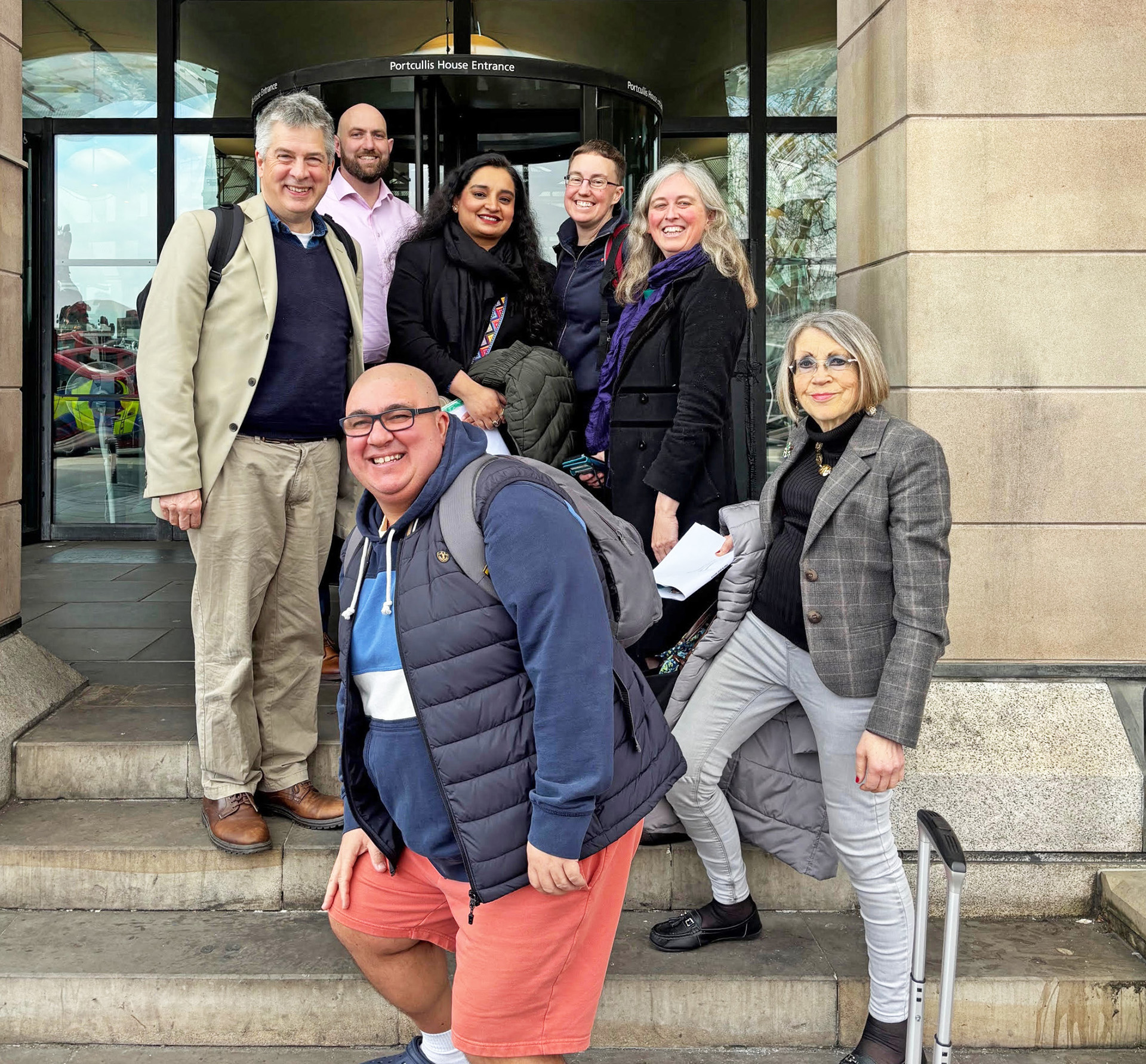
Members of the PVAI People’s Advisory Panel, plus Anna and Emily, outside Portcullis House ahead of providing their key messages to policy makers (March 2025)
Connected by Data are always fantastic to work with. It’s lovely to work with a team so passionate about enabling the public to have a voice, and so well connected they can get those voices to the people who need to hear them.
— Anna Beckett, Research and deliberative practice associate
The UK public sector and AI
We want to see the UK public sector involving the public, workers and civil society in their development and deployment of data and AI systems, and through that to reduce the degree to which these systems harm people, groups and communities; increase and improve the use of data to deliver public benefits; and build greater public trust and confidence in the use of data and AI across government.
Our experience is that even where they have the motivation, public sector capacity to involve others is limited, so we’ve been working to develop it further through targeted work in partnership with public bodies, as well as encouraging sharing and learning across a community of practitioners.
Working with the Trades Union Congress (TUC) in Wales, we held a Design Lab, on public sector practices of procuring data and AI systems in October. A participant and experienced procurement professional in local government said “You ran a practical and well focused session on a topic where the commercial interest promotes mystery and obfuscation so full marks for that.”
Working with TUC Cymru, we produced a practical toolkit for how public sector commissioners and unions can collaborate on effective procurement, from planning and oversight to monitoring and evaluation. The toolkit has been recommended as a resource by the Welsh Local Government Association. The toolkit will be used in a series of pilots by Welsh local authorities on empowering worker voice in AI, along with 2025 Welsh Government guidance on worker’s rights and algorithmic management.
In early December we held a Design Lab, alongside DSIT, exploring the role of public participation in the National Data Library as it looks to promote the sharing of public data. We have provided them with a detailed write-up of what was produced by that workshop, and are aiming to work with them to develop a more concrete approach which can be incorporated into their emerging plans.
We ran another Design Lab in February in collaboration with the Office for Statistics Regulation, from which we have co-developed practical guidance to support their work revising the Statistics Code of Practice. This will encourage statistics producers to involve and engage the public around statistics.
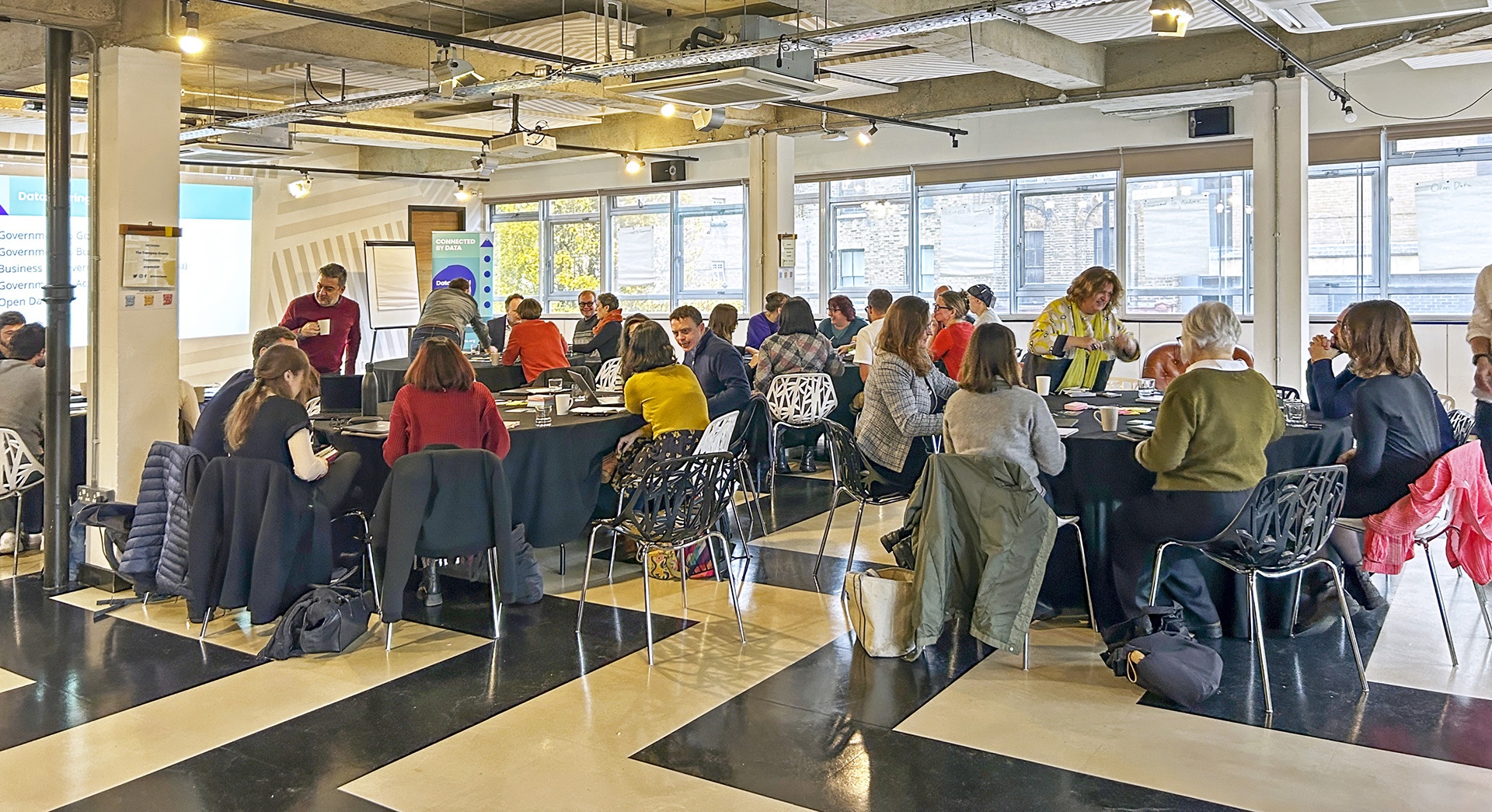
Our Participation Design Lab, co-hosted with the National Data Library team, considered how to engage the public in the development of the NDL (December 2024).
We have started to convene a community of practice, pulling together public engagement practitioners from across government departments, local authorities and related sectors (and academics). Now meeting monthly the group shares insights and learning from practitioners and Government departments (such as the Department for Education) and private sector such as FacultyAI (recordings), as well as exploring what additional support the community needs. 79 people registered for the first session and at the end of the year 138 were part of the community mailing.
Thanks everyone, really thought-provoking session! Looking forward to the unconference next week.” Post session feedback from a community of practice member
— Post session feedback from a community of practice member
We have also started authoring a series of case studies exploring how public sector organisations involve the public, workers and civil society in decisions about data and AI, and some of the consequences when they do not. We’ve published Legal Aid Agency; Confidentiality Advisory Group, procurement in Camden, and Care Full.
On Thursday 20 March 2025, CONNECTED BY DATA (with support from dxw, Projects by IF, TPX Impact, the Ada Lovelace Institute and UKGovcamp) organised an unconference on Engaging people on data and AI: giving people and communities a powerful say on public sector technologies. The event was aimed at people (particularly inside the public sector) who are interested in ensuring that public, community and worker voices are heard in decisions about data, digital and AI. Around 70 people attended the day from a range of organisations, geographies and perspectives. Topics discussed included: sharing findings; creative engagement; health data; community data capabilities; infrastructures for public participation; funding; inclusive decision-making and governance; engagement methods; and a whole heap more.
Thanks so much for all your hard work on this event! It was stimulating and interesting, time very well spent.
— Post event feedback from an unconference attendee
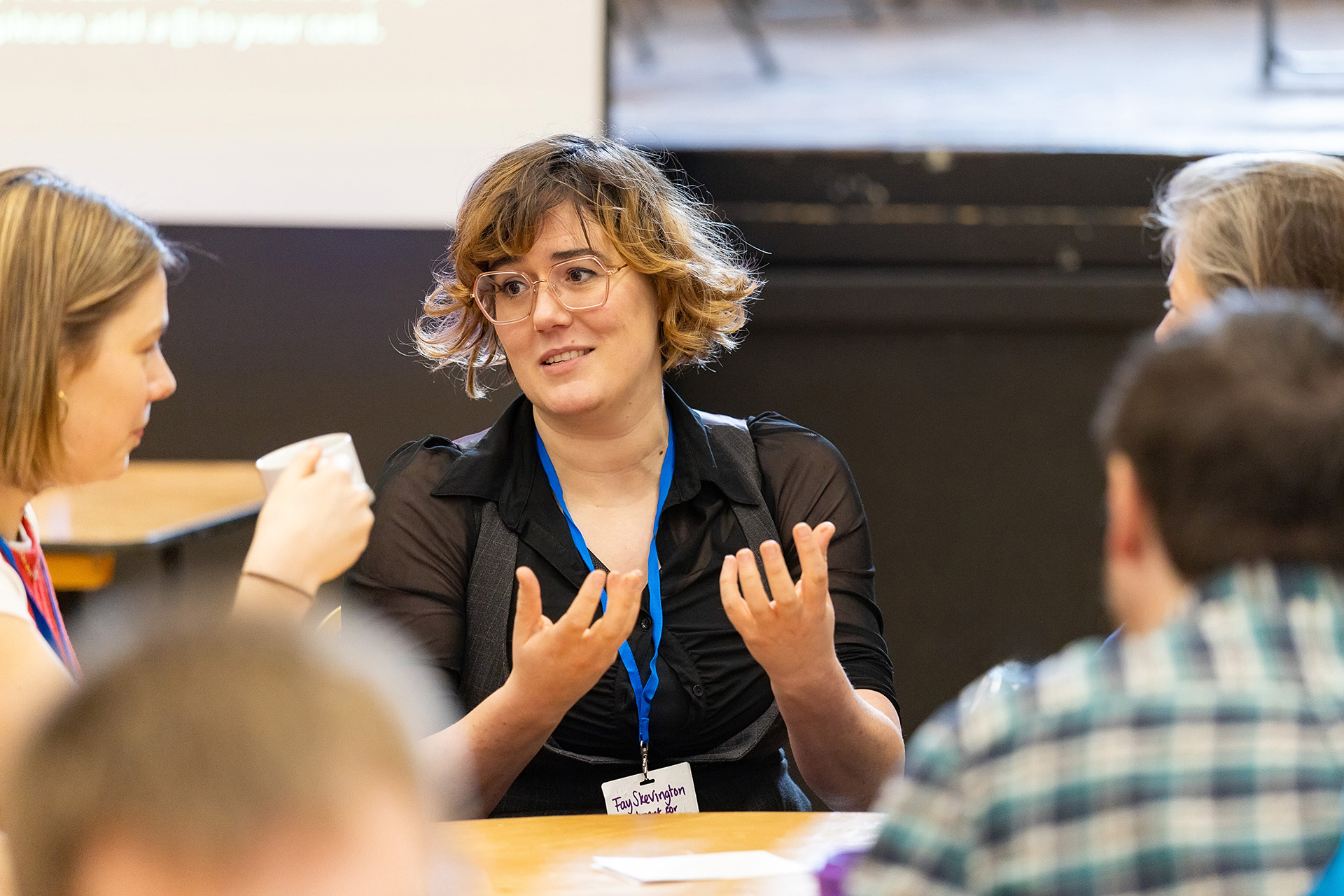
Our unconference, in partnership with dxw, Ada Lovelace Institute, TPXimpact, Projects by IF and UKGovCamp (March 2025). Photo credit: Paul Clarke (CC-BY).
Policy
We provide evidence-based public policy recommendations, build countervailing power in civil society and demonstrate collective data and AI governance in practice.
Our strategy to shape the UK’s data and AI policy towards equitable outcomes consists of three workstreams:
- catalysing a powerful civil society community,
- policy development
- and deep dives into strategic verticals.
We take what we learn in the UK into the wider international community to develop joint approaches and action.
Data and AI policy comes thick and fast, and is often politically fraught. From working on new government policy, to civil society movement building and union bargaining agendas we’re making sense of these developments and shaping the direction
— Adam Cantwell-Corn (he/him), Head of Campaigns and Policy
Influencing and coalition building: the Data and AI Civil Society Network
In 2024 we have united a diverse array of civil society organisations (CSOs) and other stakeholders through the Data and AI Civil Society Network. The Network routinely brings together over 100 diverse participants including trade unions, digital rights organisations such as Big Brother Watch and Open Rights Group, legal and research organisations such as AWO, IPPR, the Institute for the Future of Work, 5RightsFoundation and Ada Lovelace Institute, as well as mySociety, the Church of England, NSPCC, and consumer rights organisation Which?
The Network fosters intelligence sharing and collaboration across civil society. It amplifies our collective voice, ensuring that public interest perspectives are represented in discussions surrounding digitalisation and AI and acts as a source of countervailing power by mobilising broad based civil society and social movements on tech issues.
Public campaigning and political advocacy from the network helped to prevent a regressive law on data and automated decision making (The Data Protection and Digital Information Bill – DPDIB) becoming law. Using the Network, we organised with partners on briefings, public and media interventions and engaged with wider social movements to galvanise political resistance to the legislation.
We have established the Network as a centre of gravity and expression of countervailing power for civil society to influence political and policy processes. The Network is a ready-made entry point for regulators, civil servants and politicians to engage civil society. In the past two months, we have had guest attendance from the government appointee to produce an ‘AI Opportunities Action Plan’; the Information Commissioner’s Office (ICO); teams in the Department for Science and Technology (DSIT); and the Government Incubator for AI (iAI).
Building on the momentum and relationships of the Network, two dedicated Working Groups are now co-led civil society partners. The Data Bill Working Group are campaigning on the new Labour government’s data reform legislation that still needs shaping despite being shorn of the most regressive aspects of the previous Conservative government’s Bill. Unified briefings and coordinated strategies developed by this subgroup have been welcomed by busy parliamentarians. The Welfare and Tech Working Group is building capacity among welfare rights and disabled people’s groups and poverty campaigners to engage on technology issues in welfare services.
Connected by Data’s Data and AI CSO Network provides a very valuable piece of infrastructure in UK civil society. The existence of a community of different organisations in the space enables faster and more efficient coordination among different organisations instead of relying solely on existing bilateral relationships, particularly when new issues or topics arise
— Swee Leng Harris, Legal Strategy & Tech Policy Consultant
A new Government
In September we worked with the Minderoo Centre for Technology and Democracy; Connected by Data; Careful Industries; ZoomInfo; Startup Coalition (with additional support from ODI) to host a ‘Building Tech For Everyone’ reception at the Labour Party Conference attended by front and back bench MPs. Such events rival the corporate presence in political spaces and discourse shaping.
Jeni was invited by the Secretary of State to sit on the DSIT Digital Centre of Government advisory panel and we undertook policy work with the Wales Trades Union Congress (TUC Cymru) that led to engagements with Welsh Labour Members of the Senedd, including a launch of a report with cabinet members. As a member of an advisory panel to TUC Cymru, we have contributed to the drafting and subsequent formal adoption by the Welsh Government of pioneering policy on algorithmic management of workers.
While seeking to influence the Labour government directly, we have invested in building relationships with opposition parties and backbenchers. Lord Tim Clement-Jones (Liberal Democrats) regularly engages with and requests information from us and cites our work for interventions in Parliament. With the Green Party we supported the drafting of a successful party conference motion that led to new AI policy that embeds principles of democratic control. Our work was also cited in the House of Commons by Chi Onwurah MP, Chair of the Commons Science, Innovation and Technology Committee.
We’ve been lucky enough to work with lots of amazing people on so many interesting things that it’s difficult to choose one highlight! But the first meeting of our data and AI public engagement community of practice was one - brilliant speakers openly sharing their experiences, insightful questions and honest reflections from attendees and one person saying it was the best hour they’d spent that week really brought home the value of what we are doing.
— Gavin Freeguard, Policy associate
Building worker power on data and AI
The most essential purpose of work is the means to sustain ourselves. Good work can help us find meaning, community and dignity. With so much at stake, how data and AI technologies may affect work is an important concern for millions. In 2024-25 we have deepened our work with unions to build worker power on data and AI so that the rules, choices and processes of technology protect and enhance our livelihoods and wellbeing day in and day out.
Much of our work has centred in Wales, a nation that has been central to the UK labour movement historically. Now unions in Wales and TUC Cymru are grappling with how to shape AI. Connected by Data has a deep working partnership with TUC Cymru on a series of initiatives. We’re building best practice in public sector procurement of AI with a toolkit that provides an actionable framework for empowering worker voice. We’re supporting the development of training materials for union reps to understand and negotiate data and AI at work. Connected by Data has also been advising TUC Cymru as part of an AI reference group to the Welsh government’s tripartite Workforce Partnership Council. We were proud to have contributed to the development of pioneering new standards on the use of AI to manage workers in Wales, adopted formally by the Welsh Government in December 2024.
We continue to work closely with the TUC’s Tech Project, who are developing leading policy and practise on worker voice throughout the AI value chain.
We’ve also been collaborating with the Communications Workers Union (CWU) to develop the practical skills needed to identify and negotiate the impact of AI on workers in the telecoms, tech and financial services sectors. Through a series of action-oriented workshops over 5 months, union reps and officers have been digging into the concepts and tools of building worker power on data and AI and applying their learning in workplaces. With the support of Connected by Data, the CWU is leading the way nationally on a proactive and comprehensive bargaining strategy on AI in key sectors.
Connected by Data has been pivotal in assisting the CWU to tackle the AI revolution and the impact on workers. They have brought insightful ideas, research and have worked collaboratively with our reps through a learn by doing approach. This has culminated in a clear strategic steer in how we take our AI project forward.
— Nicola Marshall, Senior Policy Advisor, Communication Workers Union
Ongoing international partnerships
Alongside the UN Summit of the Future, we launched Options for Global Deliberation on AI Governance at a TechSalon New York Roundtable. The report, resulting from an extended design lab in partnership with ISWE foundation explored potential models for shaping the future of AI with inclusive and informed global citizen input. The report draws on interviews with experts from across five continents and workshops in Brussels, Oxford and online to set out five scenarios for giving global publics a powerful voice in shaping future AI regulation. Each option reflects elements of existing practice, and sets out the opportunities and challenges of different approaches to seeking public input into national, multilateral or industry-led AI governance efforts.
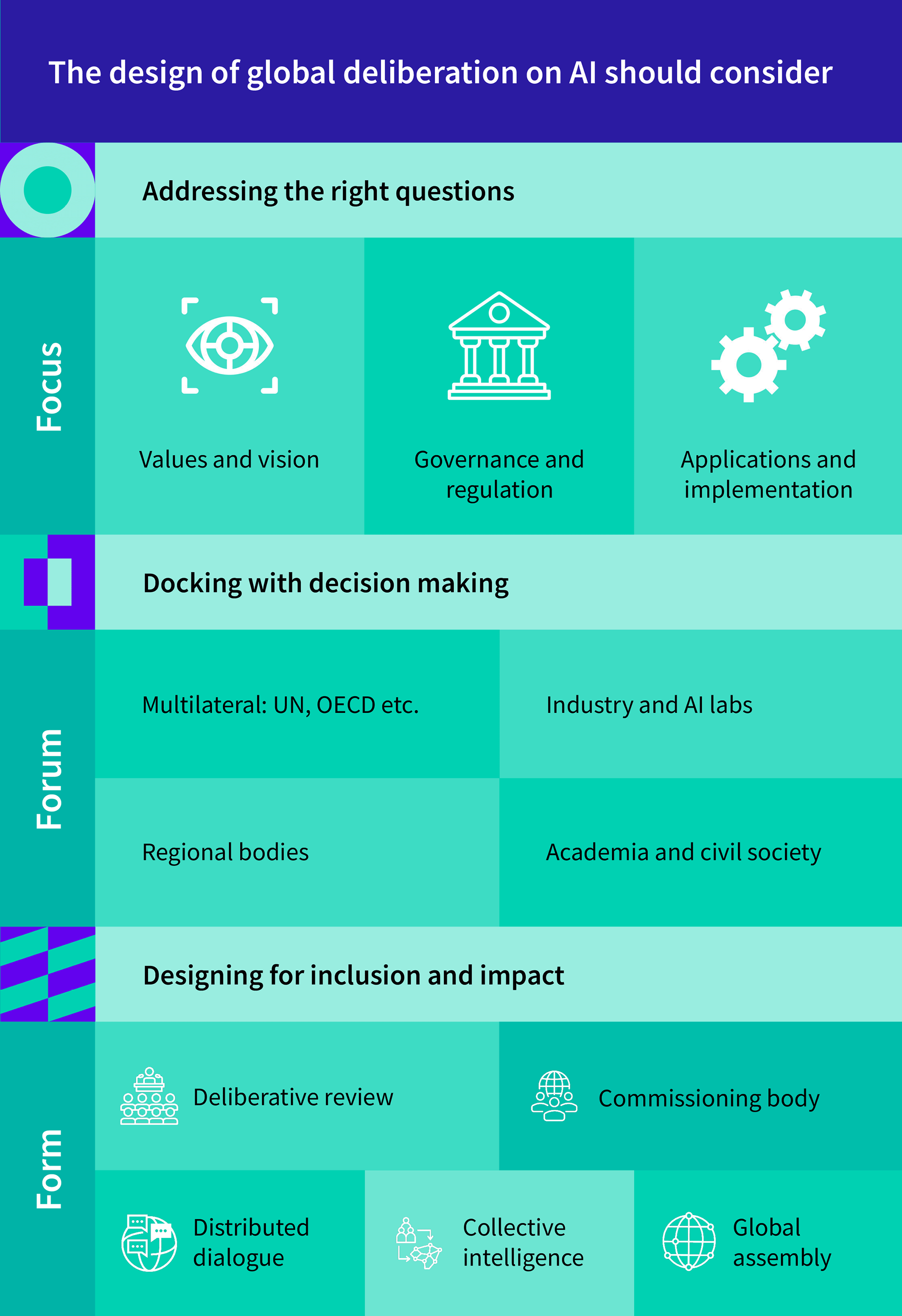
Reflecting on the breadth of practice uncovered by the design lab, as well as on silos in the field, and gaps in the evidence base, led us to develop plans for a research symposium alongside the Paris AI Action Summit (see below). We’ve drawn on Options for Global Deliberation on AI Governance to support a number of partners in developing plans for new national and global engagement initiatives.
Following the Summit of the Future, we’ve also worked with partners first convened in 2023 to support more coordinated civil society engagement with the Global Digital Compact, and ongoing international data governance processes.
Connected by Data’s recent report on global citizen deliberations on AI [is] one of the best summaries of the space I’ve come across. It is a much needed critical assessment of the use of citizens’ assemblies and related participatory mechanisms in AI governance, at a moment when citizens’ voices are too often cut out of a conversation dominated by large corporations and unrepresentative governments.
— Jake Hirsch-Allen, Senior Fellow at The Dais, Toronto Metropolitan University
The Open Government Partnership’s Digital Governance challenge calls for national and local governments to commit to “strengthen transparency and public oversight of AI, automated-decision making, and data protection frameworks” including by “creating specific public participation opportunities”. To support this we were commissioned by the OGP to carry out a mapping of organisations that are developing and leading participatory digital governance activities, and to identify possible examples of participatory digital governance that might inspire new commitments and actions.
At the Paris AI Action Summit
In February 2025 the French Government hosted the third global AI Summit. Having sought to ensure civil society representation at the event, we co-hosted an official side event with Renaissance Numérique, The Future Society, Wikimedia France, the Avaaz Foundation and the European Center for Non-for-Profit Law. This event gathered a wide diversity of actors to discuss how to build on the momentum of the Paris AI Action Summit to strengthen the inclusion of civil society in global AI governance efforts and make it more meaningful.
Our previous work with the People’s Panel on AI was referenced in a Summit Planning webinar [text transcript, September 2024] and following the Summit we were cited in a ‘Computer Says Maybe’ podcast and were quoted in a Computer Weekly article.
Community
Since our incorporation in 2022 we have amassed over 1,700 followers on X (formerly Twitter), 296 Mastodon followers, 1,880 followers on LinkedIn and have over 200 members on our Discord server. This year we reviewed our use of X in the face of hate speech and its ownership and decided we no longer wanted to be using that as a space for engagement. We reviewed our reach across all the platforms and decided to stop posting to X and Mastodon. We set up a Bluesky account and have 1,285 followers.
We organised, spoke at or participated in over 60 events and continued with our Connected by Data newsletter, that is received by 846 subscribers. We introduced a community or practice mailing list and published 18 editions of the Data Policy Digest over the year (to 740 subscribers) before it was paused due to the end of a grant that had been funding it.
It’s been lovely encountering Connected by Data quite a bit over the last year, from the Stroud gathering and the many conversations and collaborations that have developed from that, to running into Helena at MozFest! Thank you for nurturing a unique community of data, public sector, civic tech, and open source practitioners that I have learned so much from over the past months.
— Jennifer Ding, Freelancer in open and participatory AI
We hosted a further four Connected Conversations, with attendees across timezones.
| Date | Title |
|---|---|
| 23 May 2024 | Sharing progress on resources for deliberation on data & AI governance |
| 10 September 2024 | How can we ensure meaningful community and public participation in the governance and implementation of the EU’s AI Act? |
| 30 September 2024 | Global Voices: What does data governance mean to you? |
| 17 October 2024 | Generative AI and Worker Rights |
Participatory AI Research and Practice Symposium
In response to the Paris Artificial Intelligence Action Summit, we co-hosted with a range of global partners the first ‘Participatory AI Research and Practice Symposium’ (PAIRS) events (an online pre-event and an in person conference in Paris). The goal was to showcase work that demonstrates what it looks like, how and why to do it, as well as what can go wrong. Through an open call we sourced 120 paper and presentation submissions across three key themes:
- Participatory AI development
- Participatory AI governance
- Participation, power and resistance
Both events were well attended, with over 800 people registering, including campaigners advocating resistance to AI, academics critically evaluating participatory AI audits, and industry actors working to embed deliberative public engagement in the AI work of firms such as Meta. Recordings are available on our YouTube channel (online / in person). A collection of articles about the presented papers was published by Tech Policy Press.
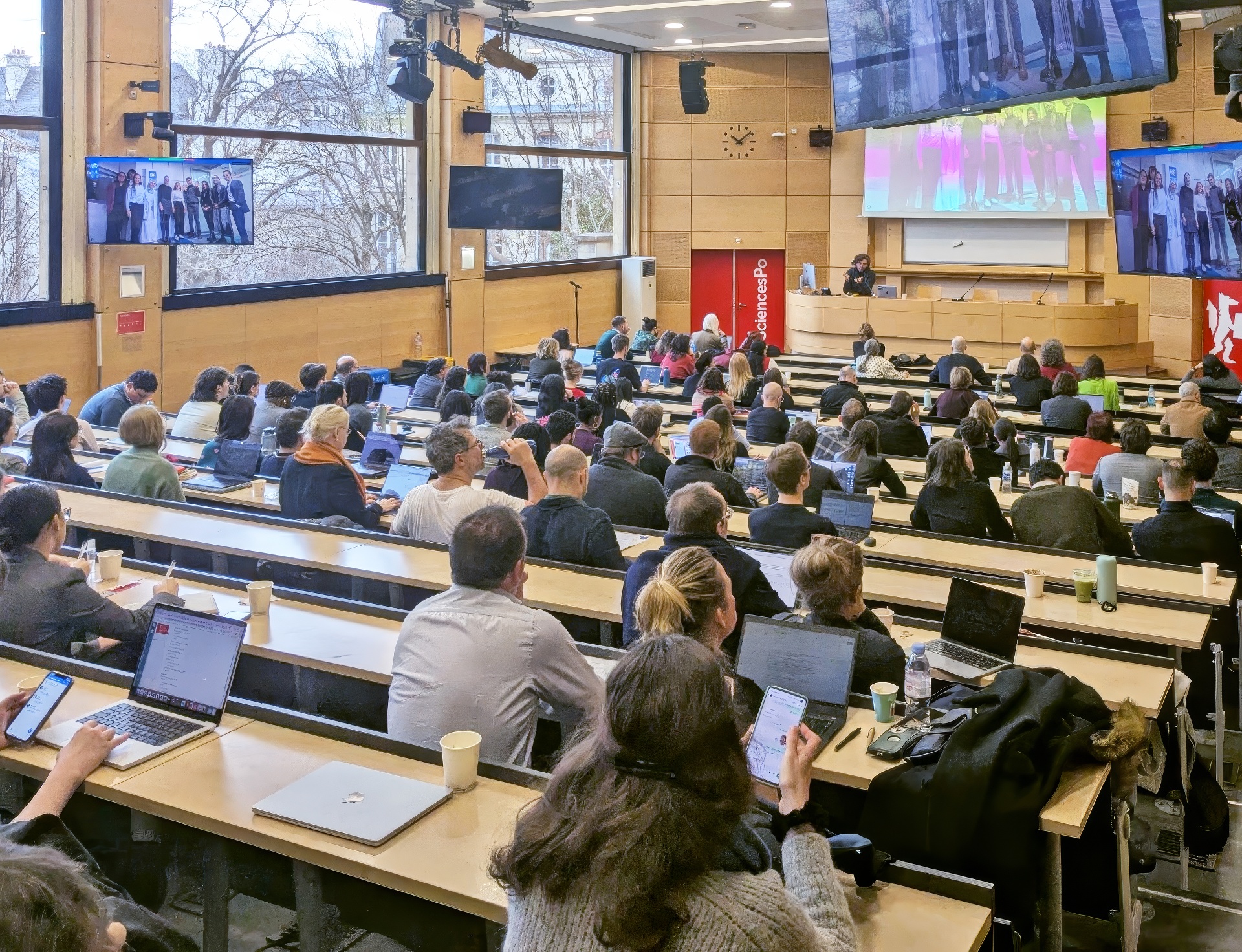
The Participatory AI Research & Practice Symposium in Paris (February 2025)
On 31st March the first PAIRS offshoot event, PAIRSx Africa took place, coordinated by Connected by Data fellow Kiito Shilongo to take place just ahead of the Global AI Summit on Africa in Kigali. The event brought together 30 participants, and gave rise to a joint letter calling for wider public engagement in future African AI governance fora.
Cultivating changemakers
Our small, but global, fellowship programme grew, with eight additional Fellows bringing new and diverse voices and perspectives to the group. Fellows are supported and mentored in a bespoke approach with a fortnightly collective online gathering, with connections brokered with our wider community.
For example, Just Treatment (a member of our community data campaign cohort) hosted an online panel event with others (including another cohort member, Behind Our Screens, and Adele Zeynep Walton, a Connected by Data Fellow) to examine Big Tech and mental health. Kiito Shilongo was a member of the PAIRS programme committee, and hosted a PAIRSx Africa webinar.
My fellowship at Connected by Data has been nurturing at many levels. As a fellow, I have the opportunity to meet regularly with the team and fellows, learn about the work being developed and contribute to timely discussions. I have also taken part in events organised by the team which allowed me to further expand my network and experience their work first-hand.
— Joana Chicau, Fellow
Organisation
In the last twelve months Helena Hollis (Field Building Lead) left the organisation to join Ada Lovelace Institute as a Senior Researcher (Public Participation & Research Practice). We have continued to work closely with Gavin Freeguard focused on UK policy and our work on ‘giving communities a powerful say in public sector data and AI’. Anna Beckett joined us as a Research and deliberative practice associate, supporting the delivery of our ‘Public Voices in AI People’s Advisory Panel’.
“The rapidly changing world, particularly in attitudes towards AI implementation is a challenging context in which to operate. I’m committed to ensure we continue to centre ‘care’ (for ourselves and others) in all our work.
— Emily Macaulay (she/her), Head of Delivery and Operations
Openness
We aim to work in the open. Our strategic roadmap for 2025-26 reflects on what we have learned over the past year and sets our intentions for the one upcoming. We continue to share our own resources and amplify those of others; write up the events we attend and organise; and regularly blog on topics we’re exploring. We also produce weeknotes which give a behind-the-scenes perspective on our work.
This year we spent some time as a team reviewing our website and its impact on our audiences. As a result we restructured it, creating spaces for our sectors of work: education; health; justice; public sector; and, work and adjusted our homepage to better amplify key work, events and messages.
Diversity, equity and inclusion
Our work is founded on an awareness of power, privilege and pluralism inspired by feminism, intersectionality, and anti-colonialism. We continue, as individuals and collectively, to challenge ourselves to improve our understanding and implementation of inclusive practice.
We’ve had two key events this year where we have sought to be intentional in our inclusive practice: the unconference; and our work with the Public Voices in AI People’s Advisory Panel. In each we planned – including reaching out to learn from others – a range of interventions ranging from photo-heavy welcome documents to thoughtfully-positioned chairs, and then ensured we were flexible and responsive to individual needs, such as needs for spaces for prayer and breastfeeding, and individualised support for participants with limited digital skills. A summary of our learning from these events has been written up in weeknotes (unconference and PVAI).
Learning
We are committed to continuously learning about what works and what doesn’t, and how to improve our impact. During 2024-25 we learned:
The big decisions about AI are out of (our) control; the smaller ones are still in our gift. The US and UK failure to sign the AI Action Summit’s communique are an illustration of how international multi-stakeholder processes have been disrupted by the Trump administration. Similarly, government legislation such as the Data (Use and Access) Bill require strong retail-politics hooks to influence significantly, particularly in the Commons. But AI adoption happens in our schools, hospitals, workplaces and homes; these are still useful points of intervention, albeit with their own challenges.
Public sector workers have a pivotal role. The public sector is a key site for AI adoption and market shaping. Public sector workers will be impacted both as workers (eg through algorithmic management) and in the delivery of data and AI driven services – from the classroom to the justice system. Public sector workers are also among the most highly unionised. These factors mean that they could use their organised power to negotiate AI policy and practice, and infuse a public service ethos and values into governmental uses of data and AI; procurement from the private sector; and engagement with the public, as well as acting in solidarity with workers in other sectors.
All campaigns are data campaigns. Uses of data and AI are so pervasive that almost all advocacy organisations will need to incorporate an element of campaigning about their use, whether it’s to have counterdata included in decision making, change how data is collected or used, or support people at the sharp end of automated decision making.
It takes effort and resources to cohere civil society into an effective countervailing force. Individual organisational incentives, including funding requirements, are generally not geared towards collaboration. There is high demand from civil society organisations that don’t specialise in data and AI to understand how technology policy issues affect their primary concerns such as criminal justice, housing, immigration, and workers rights. Dedicated support and infrastructure for fostering relationships and collaboration is vital.
The international community focused on participatory AI is strong and diverse. The Participatory AI Research Symposium we convened in Paris on 8th February 2025 significantly surpassed our expectations, with 120 paper submissions and over 800 people registering for the in-person and online gatherings. Participants ranged from campaigners advocating resistance to AI, to academics critically evaluating participatory AI audits, and industry actors working to embed deliberative public engagement in the AI work of firms such as Meta.
There is interest in public participation around data and AI from the UK public sector, but practice is immature. Identifying good case studies to point to is difficult, but there are some standout exemplars, particularly at the level of local, regional and devolved administrations.
We’ve taken these lessons into our plans for next year, which you can learn more about in our Strategic Roadmap 2025-26.
Governance
We are a non-profit company limited by guarantee and with charitable objectives (including an asset lock) written into our Articles of Association. We are a CAF International Validated Organization and have certified US Equivalency Determination. Our Governing Board is chaired by Karin Christiansen (Chair) with Non-Executive Directors Louise Crow; Karien Bezuidenhout; and Hera Hussain. Their Terms of Reference and meeting minutes are published on our website.
Funders
Thanks to our funders for their generous support during this year.
Finances
Our full financial statements have been filed with Companies House and are summarised below.
| 2024/25 | |
|---|---|
| ,000 (k) | |
| Income | 446 |
| Unrestricted grants | 74 |
| Restricted grants | 285 |
| Sales | 87 |
| Costs | 438 |
| Staff costs | 335 |
| Other costs | 101 |
| Corporation tax | 2 |
| Capital and reserves | 23 |
| Accrued 2025/26 income | 238 |






